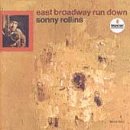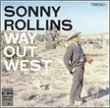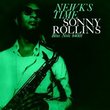| All Artists: Sonny Rollins Title: East Broadway Rundown Members Wishing: 2 Total Copies: 0 Label: Grp Records Release Date: 8/15/1995 Album Type: Original recording reissued Genres: Jazz, Pop Styles: Avant Garde & Free Jazz, Modern Postbebop, Bebop Number of Discs: 1 SwapaCD Credits: 1 UPC: 011105016124 |
Search - Sonny Rollins :: East Broadway Rundown
 | Sonny Rollins East Broadway Rundown Genres: Jazz, Pop
Japanese reissue of the jazz act's 1966 album. Impulse. 2004. |
Larger Image |
CD DetailsSynopsis
Album Description Japanese reissue of the jazz act's 1966 album. Impulse. 2004. Similar CDs
|
CD ReviewsNot quite ... Boris Godunov | Melbourne, Australia | 12/23/2003 (3 out of 5 stars) ""East Broadway Rundown" completed Sonny Rollins' short stay at the Impulse label and it has to be said that the three records he laid down there never reached the heights of stablemates such as Mingus, Coltrane and even Shepp. Not that any of these men (or anyone else for that matter) could be said to be Rollins' equal when it comes to thematic improvision, but "EBR" and "On Impulse!" simply lack the artistic coherence (in terms of choice of material, group empathy and joie de vivre) evinced on Rollins' classic recordings of the mid-to-late 1950s. The title track begins promisingly with Jimmy Garrison and Elvin Jones falling immediately into a powerful mid-to-up tempo groove. Rollins' solo unveils his matchless tone and his developing and intriguing concept of space, and Freddie Hubbard enlivens proceedings but the intensity of the piece tapers off several minutes in and the subsequent experimentation with tone and sound, while interesting at times, ultimately fails to convince. Richard Cook and Brian Morton (Penguin Guide to Jazz on Compact Disc) accurately, if pitilessly, note that "EBR" spends "a long time going nowhere." "Blessing in Disguise" is an appealing blues with a simple, almost static melodic line which continues Rollins' experimentation with the bare canvas he inscribes on the title track. While more successful than "EBR", "Blessing" also ultimately runs too long and dissipates the energy it had generated. "We Kiss in the Shadow" is taken at slow-to-mid tempo and Rollins' matchless tone is again on display. He fails, however, to carve one of the startling meditations on a theme for which he is so justly renowned. The success of the experiment of using Coltrane's most successful engine room is questionable. Doubtless they were working to instruction, but Elvin's laconic, behind-the-beat commentary somehow seems to fail to build tension cumulatively toward group epiphany/orgasm - call it what you will - the sense you get at the end of a great performance (in Rollins' case eg. "Saxophone Collossus", "Newk's Time", "Live at the Village Vanguard", even, perhaps, "The Bridge") that it has become more than the sum of its parts. "EBR" is worth a listen if you are a Rollins fan and it is an important document of the saxophonist's sonic journey; conceptually and sonically it is significantly removed from the hard-bop triumphs of the late 'fifties as well as recent successes. However, it is emphatically not a Rollins classic, nor a classic of the music as it stood in the mid 'sixties." Missed Opportunity MikeG | England | 06/19/2004 (3 out of 5 stars) "This is a strange album. Someone had the excellent idea that these four musicians should combine their considerable talents in a recording studio, but it has the feel of a session that was maybe thrown together rather than carefully planned. What they played, or what was issued, was a rather uneven programme of just three pieces. The long title track, which took up one side of the original LP, features the quartet: Rollins, Freddie Hubbard, Jimmy Garrison and Elvin Jones; the remaining two are by the trio (saxophone, bass and drums). In a passing reference to this title track, in my Amazon review of the Rollins compilation CD in the `Priceless Jazz' series, I was a bit dismissive about the performance, saying that it wastes the talents of the participants and is `rambling, self-indulgent and chaotic'. Listening to it again a few times recently I think I should withdraw at least one of those adjectives, and I find that I dislike it less than I did. It sounds initially as if it is one of Sonny's attempts to engage (maybe with more curiosity than commitment) with the `free jazz' movement that was in vogue at the time. The group seems to be going for the kind of up-tempo performance characteristic of Ornette Coleman's 1960s pianoless quartet (with trumpeter Don Cherry). I remember wondering at the time whether Sonny was in the process of permanently leaving behind the kind of improvisation within traditional harmonic and rhythmic structures on which his musical progress had been based and moving into the kind of `freedom' represented at the time particularly by Coleman, Coltrane, Eric Dolphy and - an even more `far out' player - Albert Ayler. The composition of the album seems to reflect the ambivalence of Sonny's situation: one `experimental' or `avant garde' piece (the title track) seeming to be cautiously trying out a sort of freedom, though within an element of structure, and the two trio pieces closer to traditional forms and procedures.The title piece begins with a jagged, harmonically ambiguous blues-related theme in Ornette's style, with the sax and trumpet oddly but effectively harmonised together. Although Sonny's first solo begins to exploit the opportunities for harmonic and rhythmic freedom it's not so much `chaotic' as a bit aimless: he seems quickly to run short of ideas, and to be marking time - in a way which is disappointing to hear from the `saxophone colossus' who in the previous decade was a master of logical, structured improvisation. Freddie Hubbard's solo is a more suave, polished contribution. He sounds unintimidated by the semi-`free' setting and is quite conventionally `hard-bop' in approach, in a way which sounds a bit incongruous after Sonny's abstractions, and alongside Elvin's churning polyrhythms. Elvin sounds to me like the one member of the group who is able to enjoy the tightrope walk between conventional structure and `freedom', maybe partly because it had by this time become his natural territory. He seems to me to be the one who holds this performance together - until the point, after the bass solo, when it enters its most `free' section with Sonny reduced to exploring the squeaks and squeals he can draw out of his mouthpiece. While it's not a pretty noise, there is a moment near the end where it sounds touchingly like the sounds of whales. Incidentally, at the end the opening theme returns very suddenly with pinpoint timing - probably (I suspect) because it was spliced on by the engineers after the performance itself had ground to a halt. I hope my description does enough to tell you whether it is a track which you want to (a) investigate for yourself or (b) avoid. It would be a pity to avoid the two trio performances because they seem to me to be, in their more conventional way, much better than the title track. I quote here what I said about them in my review of the `Priceless Jazz' album: `This CD performs a particularly valuable service by salvaging the two remaining tracks by the splendid trio of Rollins, Garrison and Jones, and they are so good that you wonder how the opportunity could have been passed up to make a whole album by the trio. "We Kiss in the Shadow" has Rollins playing with an unusual tender romanticism without losing that familiar depth and strength of tone, and " Blessing in Disguise" is an absorbing, exhilarating blues (its five-note theme sounds like an ironic reduction of the rock'n'roll tune, "Be Bop a Lula"), played at a slow walking pace and full of fascinating twists and turns. Garrison and, especially, Jones are in excellent form on both tracks, the drummer providing a rich tapestry of tone-colours and polyrhythms behind the saxophonist and Garrison contributing a good solo to "Blessing in Disguise"'. I've probably made my recommendation clear: unless you are a Rollins `completist', give this album a miss, read my review of the `Priceless jazz' CD and buy that in preference to this album. Unless, that is, you take the view that anything which includes the mature Elvin Jones is worth having - a view which I entirely understand." Sounds like Rollins Playing with King Crimson colinwoodward | Virginia | 04/01/2006 (4 out of 5 stars) "Recorded in 1966, East Broadway Run Down sounds wilder than anything Miles Davis was doing at the time, and it appeared three years before Davis's experimental Bitches Brew. The first song, the title track, is 20 minutes of loud bursts of sax and trumpet and extended Elvin Jones (previously John Coltrane's drummer) solos. Just when you think it's over, the song comes back, with more drums, more sax, more squeaks, and more dissonance. It sounds like a cross between free jazz and progressive rock--Rollins meets King Crimson. Tracks 2 and 3 are more straight-forward, with nice melodies. This album certainly is not for all tastes, even for those who like jazz. But, how can you go wrong with Rollins and Elvin Jones on the same album? Recommended listening for anyone who has exhausted the Miles Davis, Coltrane, Brubeck catalogue and wants to try something different."
|

 Track Listings (3) - Disc #1
Track Listings (3) - Disc #1


